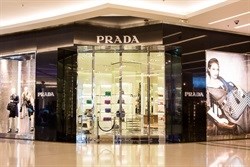
In March last year, Germany's luxury carmaker Porsche opened a new dealership on Victoria Island. This is the wealthiest district of Nigeria's capital Lagos. Its immediate catchment area is home to one of the biggest concentrations of millionaires in the world. What is more, they have a seemingly insatiable appetite for luxury brands.
These high net worth individuals (HNWIs) are mostly oil industry executives (Nigeria is Africa's biggest oil producer), entrepreneurs in commodities such as sugar and cement, owners of booming consumer-driven businesses (Nigeria's economy has grown by an average annual rate of 7% in the last five years, and by 8% in Lagos), well-heeled politicians (corruption is allegedly rife) or millionaire pastors.
Over the last five years, Nigeria's HNWIs have done most of their shopping in Milan, Paris, London and Dubai. The retail infrastructure of Lagos has never really been seen as hospitable to luxury brands despite the apparent demand. Things are changing, however. Lagos still has some way to go before it will be seen as a good fit for luxury retailers (the malls lack sophistication), but a cluster of international players have followed Porsche and are setting up shop nonetheless.
In April this year, Italy's luxury menswear label Ermeneglido Zegna opened a franchise store on the same strip as Porsche (five years down the line this strip could be Lagos' equivalent of Bond Street or Calle Serrano). Two months earlier, Hugo Boss opened a franchise store in the Palms shopping mall (located on a 45,000 square metre plot of land in the city's Lekki Peninsula). Other global brands are certain to follow. Prada, for example, has confirmed plans to open in Angola and is a good bet for Nigeria in 2015.
From the open forecourt of the Porsche dealership, one can see a huge advert for LVMH's Hennessy cognac. Nigeria is now one of the top 10 biggest markets in the world for Hennessy. The brand launched a commemorative bottle in honour of Nigeria's 50th anniversary of independence last year, which shows just how important the market has become to its global strategy. This year, consumption of cognac is forecast to break the 1 million litres mark (which is higher than in markets such as Mexico, Canada and South Africa).
Anyone looking to make a fast dollar in Nigeria will probably be disappointed, though. This is a country where the opportunity lies in the future. Porsche knows, for example, that Nigeria's roads are so badly maintained that anyone buying one of its sports cars is unlikely to be able to drive it very fast, or even very far. For the moment, wealthy Nigerians are buying Porsche not for performance but as a badge of status.
This is the nub of luxury goods demand in Nigeria. There is a fast growing bling-fuelled consumption culture, driven mainly by men and characterised by a hunger for luxury brands that are big on logos and even bigger on prestige credentials. In that sense, Nigeria is typical of any fledgling luxury goods market. As is seen in China, Russia and Brazil, the sophistication (and the spread of wealth) tends to come later.
What is arguably different in Nigeria to other emerging markets is the pervasive sense of opportunity, even among the poor. It is an African twist on the American dream. People from low-income backgrounds (in Lagos, especially) believe their time will come and in part this is down to an offshoot of Christian religion, preaching financial prosperity.
Religious services are held in massive churches that accommodate thousands of people. Inside, millionaire pastors hold court over rapturous congregations, preaching that prosperity is a sign of God's blessing. Businessmen wearing Rolex watches mingle with street traders chewing gum. These are places where God and mammon occupy the same ground.
Aspiration, which is a pre-requisite for the development of luxury goods in emerging markets, is tangible in these mega churches. However, for aspiration to turn into luxury consumption, Nigeria's burgeoning wealth needs to spread through the social classes.
Social classes D and E account collectively for two thirds of the population. Nigeria will need to implement the type of social welfare programmes, minimum wage hikes and employment stimuli that we have seen in Brazil over the last decade if there is to be significant upward social mobility.
What definitely bodes well for luxury goods in Nigeria are the youthful demographics. The average age of the population in 2012 was 22 compared with 32 in Brazil, 38 in China and 40+ in a number of developed markets. This suggests there will be at the very least an organic expansion of the wealthiest classes.
Social classes A and B, for example, are forecast to swell by almost 5 million between 2012 and 2020, compared with less than 3 million in the US and Brazil, for example. Globally, only India and China are forecast to see a bigger expansion of social classes A and B in real terms. By 2020, the total AB class in Nigeria will total around 25 million - that is around 23% more than projections for Germany and the UK combined.
There is clearly risk in entering the Nigerian market. That is a major reason why both Hugo Boss and Zegna have entered Lagos via franchising arrangements (strong local partners with local expertise are a huge asset). However, the risk starts to look small when you size up the long-term opportunity. Contrasts and contradictions aside, Nigeria is starting to look like the real deal.